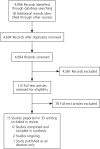Managing Antidepressant Discontinuation: A Systematic Review
- PMID: 30670397
- PMCID: PMC6342590
- DOI: 10.1370/afm.2336
Managing Antidepressant Discontinuation: A Systematic Review
Abstract
Purpose: We aimed to determine the effectiveness of interventions to manage antidepressant discontinuation, and the outcomes for patients.
Methods: We conducted a systematic review with narrative synthesis and meta-analysis of studies published to March 2017. Studies were eligible for inclusion if they were randomized controlled trials, quasi-experimental studies, or observational studies assessing interventions to facilitate discontinuation of antidepressants for depression in adults. Our primary outcomes were antidepressant discontinuation and discontinuation symptoms. Secondary outcomes were relapse/recurrence; quality of life; antidepressant reduction; and sexual, social, and occupational function.
Results: Of 15 included studies, 12 studies (8 randomized controlled trials, 2 single-arm trials, 2 retrospective cohort studies) were included in the synthesis. None were rated as having high risk for selection or detection bias. Two studies prompting primary care clinician discontinuation with antidepressant tapering guidance found 6% and 7% of patients discontinued, vs 8% for usual care. Six studies of psychological or psychiatric treatment plus tapering reported cessation rates of 40% to 95%. Two studies reported a higher risk of discontinuation symptoms with abrupt termination. At 2 years, risk of relapse/recurrence was lower with cognitive behavioral therapy plus taper vs clinical management plus taper (15% to 25% vs 35% to 80%: risk ratio = 0.34; 95% CI, 0.18-0.67; 2 studies). Relapse/recurrence rates were similar for mindfulness-based cognitive therapy with tapering and maintenance antidepressants (44% to 48% vs 47% to 60%; 2 studies).
Conclusions: Cognitive behavioral therapy or mindfulness-based cognitive therapy can help patients discontinue antidepressants without increasing the risk of relapse/recurrence, but are resource intensive. More scalable interventions incorporating psychological support are needed.
Keywords: antidepressants; deprescribing; depression; discontinuation syndrome; mental health; prescribing; primary care.
© 2019 Annals of Family Medicine, Inc.
Comment in
-
Antidepressant discontinuation can be problematic for patients but relapse rates might be reduced with cognitive behavioural therapy or mindfulness-based cognitive therapy.Evid Based Nurs. 2019 Oct;22(4):112. doi: 10.1136/ebnurs-2019-103085. Epub 2019 Apr 4. Evid Based Nurs. 2019. PMID: 30948434 No abstract available.
References
-
- McCarthy M. Antidepressant use has doubled in rich nations in past 10 years. BMJ. 2013; 347: f7261. - PubMed
-
- Pratt L, Brody D, Gu Q. Antidepressant use in persons aged 12 and over: United States, 2005–2008. NCHS data brief no. 76 Hyattsville, MD: National Center for Health Statistics; 2011. https://www.cdc.gov/nchs/data/databriefs/db76.pdf. Published Oct 2011 Accessed Jun 2018.
-
- Mojtabai R, Olfson M. National trends in long-term use of antidepressant medications: results from the U.S. National Health and Nutrition Examination Survey. J Clin Psychiatry. 2014; 75(2): 169–177. - PubMed
-
- Kendrick T, Stuart B, Newell C, Geraghty AWA, Moore M. Did NICE guidelines and the Quality Outcomes Framework change GP antidepressant prescribing in England? Observational study with time trend analyses 2003-2013. J Affect Disord. 2015; 186: 171–177. - PubMed
Publication types
MeSH terms
Substances
Grants and funding
LinkOut - more resources
Full Text Sources
Medical

